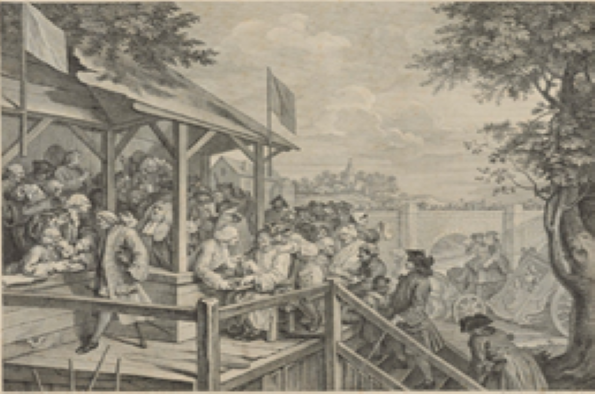
Eighteenth-Century Political Participation and Electoral Culture
- Dr Craig Stafford
- Admission: This is a free event
Add this event to my calendar
Click on "Create a calendar file" and your browser will download a .ics file for this event.
Microsoft Outlook: Download the file, double-click it to open it in Outlook, then click on "Save & Close" to save it to your calendar. If that doesn't work go into Outlook, click on the File tab, then on Open & Export, then Open Calendar. Select your .ics file then click on "Save & Close".
Google Calendar: download the file, then go into your calendar. On the left where it says "Other calendars" click on the arrow icon and then click on Import calendar. Click on Browse and select the .ics file, then click on Import.
Apple Calendar: The file may open automatically with an option to save it to your calendar. If not, download the file, then you can either drag it to Calendar or import the file by going to File >Import > Import and choosing the .ics file.
Yet parliamentary elections were fundamentally important to all, not only for the selection of MPs, but also in bestowing a sense of power and belonging (even if only temporarily), as well as in helping to form the nation's self-image, and in forging a new constitutionalist tradition. Elections not only affected, but also engaged, a wide section of the population - both those enfranchised and those not. Elections were often accompanied by an explosion of print, sermons, pamphlets, squibs and songs; there were countless ceremonies, treats, speeches, and election balls; even ceramics, dress, and decoration could be politicized. Men and women, adults and children, rich and poor, franchised and unenfranchised, could participate — as consumers, but also as active makers — in this unique cultural and political experience.
This presentation will introduce you to our three-year AHRC-funded project, Eighteenth-Century Political Participation and Electoral Culture and,specifically, to the role of postdoctoral research assistants, Drs Harris and Packham, in developing a large, complicated and ambitious piece of research that not only collects and interprets new polling data from constituencies across England 1696-1831, and works with a team of computer specialists to use innovative digital tools to make this information accessible to the general public, but also gathers additional insights through newspapers and cultural artefacts and practices, that provide insights into people's lived experiences of elections. By placing polling data in its cultural contexts, we will come to understand whether the elements of campaigning — print and processions, banquets and ballads, sashes and sermons — made a difference to political outcomes, or left any significant legacy beyond election time.
Hosted by Prof Elaine Chalus, Dr James Harris and Dr Kendra Packham
Please email your interest to cns2011@liverpool.ac.uk for the event zoom link.
